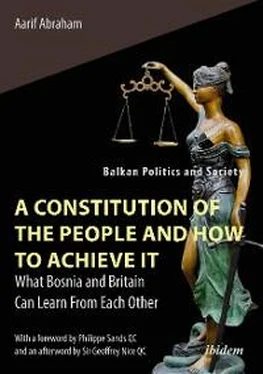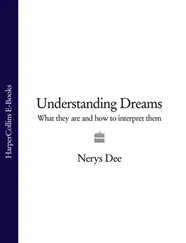Given that the use of such models has been neglected in the study of Bosnia’s political paralysis, this book aims to add to existing work by identifying the precise causes of failure in the institutional structures in Bosnia inhibiting meaningful constitutional reform and civic participation in politics. That would go some way to creating a Bosnia based on individual rights and equality rather than the presumed collective equality of ethnic groups. For Britain, this book seeks to draw together disparate thinking on suggestions for constitutional reform and attempts to reconcile competing models. The analytical models deployed allow a pathway out of constitutional paralysis, contestation and crises. Practical proposals are provided as to how States can enjoy higher civic participation in politics, fairer bargains between groups and increased democratic legitimacy. Britain and Bosnia may benefit, but so might others. ۞
| “And when we saw this script we’d never seen before In front of our very eyes from far-off times of yore A long silence Fell between Us |
And half Amazed |
| This stillness was broken by a voice that was calm but outspoken – No scribe wrote this text for sure It looks like someone Was trying to Draw |
Look it’s a secret text from the darkest days of old Rising it seems from the depths of our murkiest Dreams Its signs are like writing Seen in a mirror— Mutters A mouth Calm and Cold |
| And then a second says racking his brains— Look at the right that might be where it begins And it’s merrily flowing leftwards Widdershins Who was such writing Written for |
The fifth with clenched fists and trembling fingers tries to hold This mirror of clear redeeming grace But it slips To the Floor |
| Those who insist on reading from right to left Are wrong all along— A third one says half crazed |
For in it that instant he recognises His own Ancient Forgotten Face.” |
— Mak Dizdar, The Stone Sleeper 26
1An extract of a poem called “BBBB” by Mak Dizdar [1917-1971] (2009, 50) .
2These, possibly apocryphal, remarks were widely reported to have been made by the Queen at a lecture being delivered by Prof. Peter Hennessy at Queen Mary College, London. See further, Hennessy’s (1995) own account of the event. Bogdanor (2009) gives an account of another incident. The Queen attended an event at University College London where she came upon a book called The Changing Constitution , edited by Prof. Jeffrey Jowell. She reportedly said to Jowell, who was standing nearby, “Changing, Professor Jowell, what changes? I haven't noticed any changes!” Jowell replied, “Well, evolving, Ma’am, evolving.” She responded, “Yes, but in what direction?”
3Bosnia and Herzegovina is referred to throughout as “Bosnia”.
4The State constitution was agreed as Annex IV of the General Framework Agreement for Peace in Bosnia and Herzegovina , initialled at Dayton on 21 November 1995 and signed in Paris on 14 December 1995. It is referred to throughout as the “Bosnian constitution”.
5Richard Holbrooke, the principal negotiator of the Agreement, maintains that “on paper, Dayton was a good agreement; it ended the war and established a single, multi-ethnic country.” His caveat is that “the results of the international effort to implement Dayton would determine its true place in history.”
6There is also the self-governing district of Brčko in the North of Bosnia which is under international supervision.
7There have been three substantial reform processes since 2005 all of which have failed as a result of intransigent, ethno-nationalist positions taken by the elected representatives. There have also been two missives for reform that are very significant. These are all addressed in Chapter 4.
8The constitution contravenes international law in a number of ways. For instance, only members of the three main ethnic groups are allowed to run for the office of president; members of the country's many minorities, such as Roma and Jews, are excluded as candidates. Also, individual rights are subservient to ethno-national group rights which permit vetoes, quotas, and exclusive ethno-national representation to the elected representatives of the groups.
9Approximately 613.22 million USD in 2019 (PIC 2020).
10The comparison between Bosnia and Britain is not straightforward as the accounting for the cost of government administration is different in the two countries. The figure for Britain is a composite of the following: costs of government administration for the state at 10.1 billion USD, 2019 (HM Treasury 2019); cost of running both Houses of Parliament at 766.25 million USD, 2019 (IfG 2020); cost of the running the central government estate at 3.56 billion USD, 2018 (Cabinet Office 2018); total budgetary receipts 1,054.21 billion USD (OBR 2020). The UK GDP for 2019 was 2,829.10 billion USD (World Bank 2020).
11This issue is touched upon in Chapter 1 and further elaborated upon in Chapters 3 and 4.
12This claim in no way relates to policy issues and the very severe crises that emanated over the past 350 years. It also does not discount the violations of rights by the British state, whether domestic or international.
13The common law, however, does provide that certain statutes that are deemed, by the courts, to have constitutional significance may only be repealed, amended or abrogated if done so expressly by Parliament. This is further discussed in Chapters 4 and 6.
14This is notwithstanding the fact that it was Conservative politicians who helped pioneer and draft the international instruments that protect fundamental rights including the European Convention on Human Rights (“ECHR”).
15In leaving the European Union, British citizens lost a host of rights that have not been directly transposed into domestic law, the most significant of which were rights enshrined in the Charter on Fundamental Rights. In respect of the ECHR, it has been a Conservative Party Manifesto commitment, since 2010, to leave the ECHR.
16See further Ackerman (1991, 1992). Constitution moments are understood to “emerge from an exceptional moment of higher-order law-making under the liberal constitutional paradigm” (Bali and Lerner 2016).
17This is based on the case study of elite behaviour in the State institutions (Chapters 4 and 5) together with the quantitative analysis (Chapters 2 and 3) demonstrating the scope for accommodation amongst the population at large.
18See the very cogently argued piece by Bonnie (2001, 801).
19The incentive structures built into the peace agreement is, unsurprisingly, to the advantage of those negotiators (Bassuener 2020, 225).
20On the issue of constitutional reform, at least, and arguably on almost all policy issues given the way the electoral laws and districts operate.
21The term ‘deliberative’ has helpfully been defined by Ghai and Galli (2006) to mean “a process of negotiation which is based on clear goals (of the national interest and social justice) and sufficient information and knowledge, aimed at exchanges of ideas, clarification of differences, persuasion and agreement. This requires a degree of facilitation, and a critical question is who does this and under what procedures.”
22The idea that political elite’s decision-making is in the name of ‘the people’ would no longer ring hollow and the people would find it more difficult to blame political elites alone for intransigence given that all the people will now have an opportunity to participate.
23Another title may be the Millennium Magna Carta or the Charter of the People .
24Given the different paths Croatia and Bosnia have taken following the war and the relative political ‘success’ of Croatia the comparison is immensely useful in analysing variations, if any, in ‘culture’ and levels of apathy.
Читать дальше












